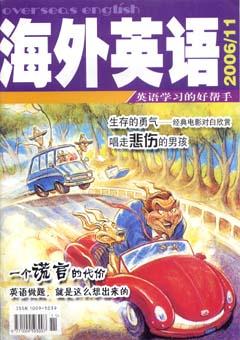教你正确用(十七)
Xiao Ge
Last month,I spent a few days in Beijing—quite a place now. English has definitely become an important part of the life of this cosmopolitan city. Most signs in restaurants, department stores, and on highways are not only in Chinese but also in English.Today,lets have a little chat on the “sign language” —not the sign language with hand gestures for people who are not able to hear or speak,but English that appears in some of the signs in Beijing.
Welcome—Welcome Again
欢迎光临与欢迎下次光临
There was a McDonalds close to the hotel I stayed in Beijing. Customers walking in can see “Welcome” printed on the outside of the door. After a hearty meal,customers going out of the door can see “Welcome Again” printed on the inside of the door. The first “welcome” is easy to understand, but “welcome again” is a bit puzzling. It took me a while to realize that the Welcome on the outside of the door means欢迎光临 and that on the inside means “欢迎下次光临.” This combination makes sense in Chinese, but not quite in English.
There are a few ways to use the word “welcome” in English. One main usage is to greet people. “Welcome to my house,”“welcome to Beijing.” When I arrived in New York,a customs officer greeted me with “welcome back!”But,most of the time,“welcome” is used to greet people when they are coming to a place or a gathering, which could be your house, a restaurant,a party, or even a persons own home after he or she has been away for some time. When people are leaving,usually we dont say “welcome.” At departure,if you have enjoyed your guests company,you may say “hope to see you again soon,”“come back soon,”or “do come back.” In America,people in the countryside and in the South often say “come back again, you hear?!”Here,the host is trying to make sure the guest will come back to visit again.
The word “welcome” is also often used in the expression:he has overstayed his welcome, meaning the guest stayed longer than the host wanted or the guest did something that made the host unhappy. When a host sends off a guest with “welcome again,”it sounds like the host is saying to the guest “you have not overstayed your welcome this time,so well still welcome you next time.”
Some readers may ask,“can we use ‘welcome again at all?” Yes,of course you can,and its perfect for some circumstances. This morning I listened to the radio,and the broadcaster said,“welcome to the Morning Show.” In the middle of the show,there was an intermission. After the intermission,the broadcaster came back and said,“welcome again to the Morning Show.”
Well, having said so much about when, where, and how to use “welcome again,”Id like to mention again that a language is more flexible than we sometimes think it is. A seemingly incorrect expression will become part of our daily speech when enough people use it often and long enough. There are more than one billion Chinese people;if we keep saying “welcome again” when sending off our customers and guests,this expression,who knows,may be eventually accepted as part of the regular English speech. Remember “long time no see”? Some two hundred years ago,the first Chinese workers came to the United States to help build this country. Being not able to speak good English, they translated a Chinese greeting,好久不见, directly into English. It made no sense to the local English speakers,but the Chinese workers kept using this phrase when they met the local folks. Now “long time no see” is accepted as a regular greeting in English:Never give up!
Create Your Own Expression
As we have just mentioned above,English—as well as all other languages I would think—is a flexible one. New words are being coined,new expressions created,and old ones discarded. Sometimes,grammatically incorrect expressions can be accepted as correct ones when they have been repeated enough times by enough people. Often times we can also create our own expressions if we can define them properly. The other day,I was trying to come up with a definition of “happiness” of my own, and I am sharing it here.
Is Happiness All the Same?
大幸福和小幸福的定义
Once upon a time,a bunch of Americans crowded in a small Philadelphia court room and claimed that man (woman too,later their sons and grandsons realized) has the inseparable right in the pursuit of happiness. But, they forgot to tell people what happiness was. While we all pursue happiness, being happy means different things to different people.
I think people in Beijing generally look happy. I saw happy people driving big fancy cars. I saw happy couples eating in restaurants. I saw young people hand in hand strolling in the park—they are happy. I saw migrant workers squatting on a piece of log, sucking on a bow of noodles—they, too, look happy to me. I guess there are big happiness and small happiness. Graduating from college, having a new job, falling in love, getting married, and so on and so forth are big happiness to many. For some,big happiness still means different things. Making a lot of money makes some really happy; crushing someone with a BMW and eventually getting away with it can be the ultimate happiness for others. But, big happiness only happens a few times in ones life.
Personally, I like “small happiness.” Receiving and giving out a gift make me happy. Getting a call from a long-unheard friend makes me happy. Spending time with loved ones makes me happy. These small happy events put together my big happiness. Sometime in the 19th century,an old Russian named Leo Tolstoy said that happy families are all alike, but every unhappy one is unhappy in its own way. Well,that was then.
Never forget to talk to your teacher before coming up with your own English expression. Till next time, see you at xiaoge@aol.com.

